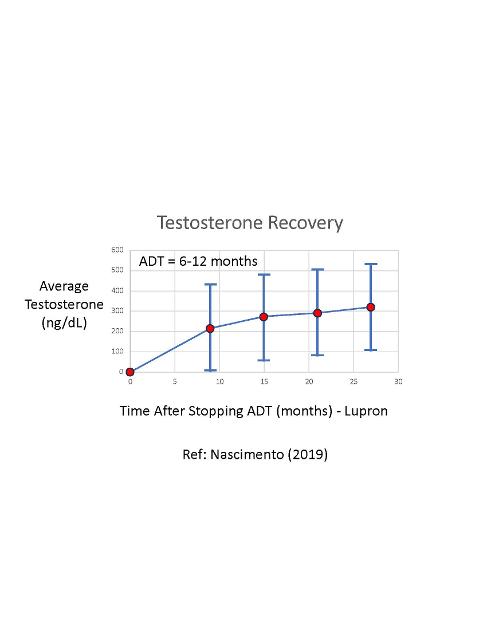Here's the first of four plots showing testosterone recovery after stopping Lupron ADT. The testosterone recovers quickest in the first 12 months, but then flattens out after that.
Testosterone Recovery after stopping ... - Prostate Cancer N...
Testosterone Recovery after stopping ADT -1

It depends on how long you've been on it, and your baseline T level. And there's tremendous interpersonal variance. See section III below:
prostatecancer.news/2023/04...
Thanks ! I agree.
Notice the large range (vertical error bars) for each [average] data point, equal to approximately 400 ng/dL (200 +/ 200 -).
Also, please see the other plots that I posted. They show how much the testosterone recovery varies with duration of ADT. To first order, the recovery time for 50% of men to fully recover their baseline testosterone is approximately equal to the duration of ADT treatment.
Age is as much a factor also, particularly biological age. Those more fit and strong recover faster. Also ADT type. Orgovyx leaves the body much quicker upon cessation.
I wish I could find data on age-effect on T-recovery time. I just posted a plot that shows a slower recovery time for men with a lower baseline T, as compared to men with a normal baseline T. The age effect could account for this trend: older men naturally have lower testosterone levels.
Yes, Orgovyx is much faster ON/OFF.
Age contributes to the trend, sure, but chronological age is just another confounding factor.
ADT accelerates biological age dramatically without strong intervention, but as with the general population in the developed world, the diet and exercise habits of men with Pca are statistically very poor.
How much this affects ADT T recovery one can only guess. What is known is that in men with poor overall health, T levels tend to decline at a disproportionate rate with age.
I agree. Excellent points.
The practical contribution to decision making for any individual seems difficult. My oncologist alao says whilst age, length of ADT and general health are factors - they see frequent outliers and individual variability even with older longer ADT particularly with first line curative intent RT and HT.
Indeed my friend had chemo plus RT plus 3 years of ADT and after stopping nothing for 12 months and then full return and 2 years in stayed normal T and no recurrence so far. He is only 67 but all the same! Not typical
It’s also problematic as when you stop ADT you just don’t know how or if T will recover and counter the ongoing side effects of lack of T.
Here's the best plot of T-recovery versus time for different durations of ADT. But, these represent average or median values. There is naturally considerably scatter among the data., with age and physical fitness being the primary confounding factors.